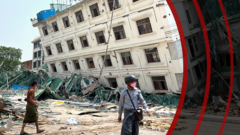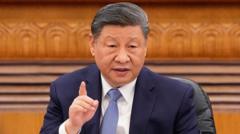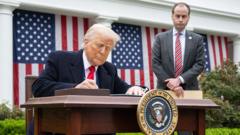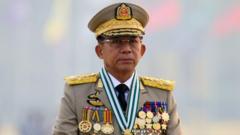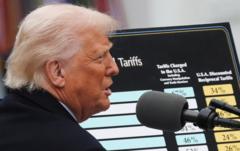Amidst rising tensions, U.S. legislators question the government's commitment to global humanitarian responsibilities, as other nations extend assistance following a devastating earthquake in Myanmar.
Senators Critique U.S. Aid Response to Myanmar Earthquake Crisis

Senators Critique U.S. Aid Response to Myanmar Earthquake Crisis
Democratic lawmakers express discontent over the U.S. humanitarian aid efforts in light of recent disaster relief actions from China and Russia.
In the aftermath of a catastrophic earthquake in Myanmar that has resulted in the death of over 2,700 people, Democratic senators are voicing their criticism of the Trump administration's lackluster response regarding humanitarian aid. A letter, spearheaded by Senator Chris Coons of Delaware and addressed to Secretary of State Marco Rubio and Treasury Secretary Scott Bessent, highlights a growing concern among lawmakers about the dwindling U.S. engagement in foreign aid efforts, particularly in times of crisis.
The senators argue that the response thus far, characterized by a notable absence of specialist aid teams, signifies a troubling deviation from America's traditional role as a reliable partner in global humanitarian relief. Countries like China, Russia, India, and several Southeast Asian nations have already dispatched rescue and relief teams to assist Myanmar in its time of need, raising questions about the United States' standing on the international stage.
In their letter, the senators emphasized the imperative for the U.S. government to provide sanctions waivers for earthquake relief operations heading into Myanmar, insisting that failing to do so undermines not just the moral, but also the strategic objectives of the U.S. They warned that an inadequate response would foster perceptions that adversarial nations are more dependable allies in crises.
As the situation in Myanmar unfolds, the urgency for U.S. action becomes increasingly critical, with lawmakers urging the administration to reconsider its foreign aid policies to avoid further alienation from global humanitarian initiatives and recognition.
The senators argue that the response thus far, characterized by a notable absence of specialist aid teams, signifies a troubling deviation from America's traditional role as a reliable partner in global humanitarian relief. Countries like China, Russia, India, and several Southeast Asian nations have already dispatched rescue and relief teams to assist Myanmar in its time of need, raising questions about the United States' standing on the international stage.
In their letter, the senators emphasized the imperative for the U.S. government to provide sanctions waivers for earthquake relief operations heading into Myanmar, insisting that failing to do so undermines not just the moral, but also the strategic objectives of the U.S. They warned that an inadequate response would foster perceptions that adversarial nations are more dependable allies in crises.
As the situation in Myanmar unfolds, the urgency for U.S. action becomes increasingly critical, with lawmakers urging the administration to reconsider its foreign aid policies to avoid further alienation from global humanitarian initiatives and recognition.



